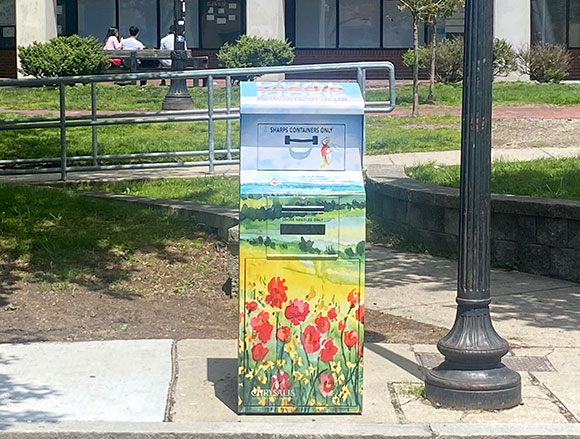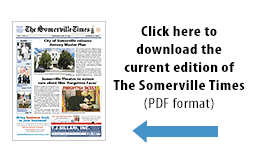
In addition to the already existing sharps container, a second public health vending machine has been approved for installation in Somerville by the city’s Finance Committee. — Photo by Bobbie Toner
By Jeffrey Shwom
City health officials received approval by the City Council’s Finance Committee for three positions that keep youth in safe, productive, and preventative environments, and a second public health vending machine aimed to offer harm reduction items that test for a sedative widely found in street drugs and an overdose reversal medication.
The $228,000 in salaries and benefits is funded through the remaining medicinal marijuana stabilization fund and the vending machine through a $30,000 matching grant from RIZE Massachusetts Foundation, a nonprofit dedicated to ending and reducing the impact of the opioid epidemic. Both items will now move up to the full city council for approval. Officials are still curating the potential items for the vending machine, Carroll noted, and are considering resources like xylazine test strips and Narcan.
The department received approval for the first machine that would stock things like winter hats, gloves, and socks during the colder months of the year and sunscreen, water, or first aid supplies during the summer, as noted by Councilor Jake Wilson. Caroll said it would be more or less three items at a time, and the data collection will inform what items will be cycled through the machine. The prevention team is “excited to be seeing this move forward in the next year,” especially as it celebrated an April installation of a first-in-the-nation dual sharps disposal kiosk on Seven Hill Park in Davis.
The department got the thumbs up for an out-of-school-time coordinator, a youth workplace learning coordinator, and a substance abuse prevention and intervention specialist. The out-of-school-time position makes sure all K-8 students, regardless of circumstances and their background, “have access to inclusive and culturally relevant” programs, director of health and human services Karin Carroll shared in a May 1 memo. The learning coordinator will strive to expand the mayor’s youth jobs initiative, summer jobs program, and school-year jobs programming, employing 18 youth.
The substance abuse position provides “support for students and staff with drug and alcohol education, prevention, intervention, and consultation.” “Out-of-school time opportunities, youth employment, in-school substance misuse support, and structured, supervised activities all serve as vital buffers against increased exposure to substances and substance misuse.”
At the May 21 meeting, officials reported feeling hopeful that these positions will be funded “adequately for a few years” before money runs out. Created by city council approval in 2018, the medicinal marijuana stabilization fund received three percent of gross sales from the approved marijuana dispensaries in the city and currently sits at $3.5 million. It also got some American Rescue Plan Act of 2021 awarded during the COVID-19 pandemic, though the requirements for the fund have changed since its inception, so dispensaries are not contributing as much as before, if at all.
This is not the first time that cannabis stabilization funds have been used to fund health and human services positions. Since 2018 and reaffirmed in April, the department received continuation of funding for its prevention services coordinator position, which organizes youth substance misuse prevention and education activities.














